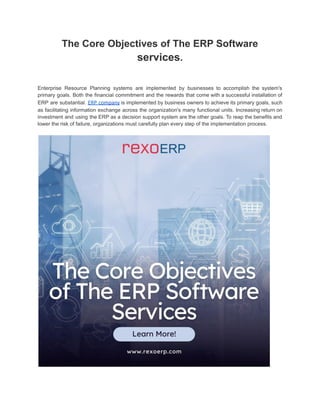The Core Objectives of The ERP Software services.pdf
•
0 likes•4 views
We are an ERP software development company. Here we are presenting our product which is Rexo. We are not some random bunch of software developers. We are "REXO". The name Rexo evokes eagerness, audacity, and responsibility. And here is RexoERPwhich is for all industries. We are a leading smart ERP solution & service provider from central India, comprising a team of enthusiastic IT professionals keeping the experience from 20+ years to many, continuously working to help society with the optimal use of IT for life and work.
Report
Share
Report
Share
Download to read offline

Recommended
Recommended
More Related Content
More from RexoERP
More from RexoERP (9)
Choosing the Right ERP Solution for Furniture Companies

Choosing the Right ERP Solution for Furniture Companies
Improving Engineering Efficiency With ERP Software.pdf

Improving Engineering Efficiency With ERP Software.pdf
How ERP Brings Increased Productivity for the Financial Sector.pdf

How ERP Brings Increased Productivity for the Financial Sector.pdf
Benefits of ERP For a Construction Company (1).pdf

Benefits of ERP For a Construction Company (1).pdf
The Core Objectives of The ERP Software services.pdf
- 1. The Core Objectives of The ERP Software services. Enterprise Resource Planning systems are implemented by businesses to accomplish the system's primary goals. Both the financial commitment and the rewards that come with a successful installation of ERP are substantial. ERP company is implemented by business owners to achieve its primary goals, such as facilitating information exchange across the organization's many functional units. Increasing return on investment and using the ERP as a decision support system are the other goals. To reap the benefits and lower the risk of failure, organizations must carefully plan every step of the implementation process.
- 2. The core objectives of the ERP are as follows: 1. Streamlining the information: There are certain modules that makeup ERP to assist in simplifying the information flow between the different operational departments. To facilitate information exchange, all departments' data are housed in a single database. One of the main goals of the ERP is to combine the data and allow the staff to collaborate as a team to accomplish a common purpose. The management of resources is improved via business process automation. 2. Return on investment or ROI: Making the company more lucrative is another one of the ERP's main goals. Companies invest in cutting-edge technology to stay competitive and increase profits. If done correctly, implementing an enterprise resource planning system can result in a higher return on investment. The best platform for employees to make the most use of their time and resources while also favorably impacting the company's bottom line is ERP. 3. Decision Support System: he management may quickly access real-time data at any time thanks to ERP. It is simple to get access to current information and make decisions swiftly. One of the main goals of the ERP is to deliver the appropriate data at the appropriate time so that the management may act quickly and wisely. As a result, decision-making is improved, and ERP serves as a system for making decisions. Integrating data and putting into effect industry best practices are two of the main goals of the ERP. It tries to lessen redundant work and manual processes that require a lot of labor. The company saves time and money in this way. It streamlines the processes, which boosts efficiency. The organization can store and distribute data in a consistent method by getting rid of the various systems. When implemented properly, ERP lowers expenses while also achieving its primary goals. To avoid any delay and errors, cooperation and communication are necessary. To achieve the main goals, careful preparation and research are necessary. When top management is actively involved in the project, a greater ROI, easy data flow, and support for judgment may be achieved. It is imperative to properly research and plan every aspect, from selecting the ERP solution to ongoing maintenance.
